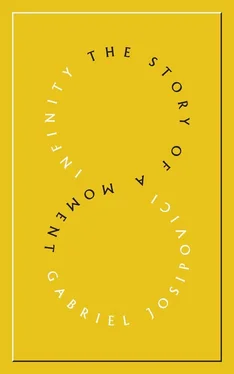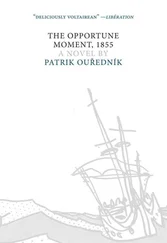Gabriel Josipovici
Infinity: The Story of a Moment
An extract from this work was first published in issue 34 of The Reader (Summer 2009).
Infinity: The Story of a Moment

I asked him first how he had come to work for Mr Pavone.
— I heard he was looking for someone, he said.
— How did you hear?
— One hears.
— You had been in service before?
— To tell you the truth, sir, I was out of work. I had been working for my brother-in-law, but that had come to an end. I presented –
— Why had it come to an end?
— These things happen, sir.
— Of course. What were you doing for your brother-in-law?
— You asked me to talk about Mr Pavone.
— Of course. Please go on.
— I presented myself to Mr Pavone but he told me the post had already been filled. He took my number, though, and several days later he called me and asked me to come and see him.
— It was then he offered you the job?
— Yes, sir.
— What was your impression of Mr Pavone?
— In what sense?
— How did he strike you?
— Strike me?
— When you first met him, yes.
— As you know, sir, Mr Pavone was not your ordinary sort of gentleman. First of all he was Sicilian, you understand? And Sicilian gentlemen, Sicilian nobles, for Mr Pavone was a nobleman, the descendent of a very noble family, you know, sir, Sicilian nobles are a breed apart. And then he was an artist. You know that artists are called by God, and, if I may say so, are His servants as much as the Pope himself. But, above all, he was himself.
— What do you mean, he was himself?
— He was himself. That is all I can say.
— But isn’t each of us himself?
— No sir, if I may say so, sir. Not in that way.
— In what way?
— He was a singular gentleman.
— In what way was he singular?
— In every way.
— Can you give me an example?
— In every way. I had never met and I have never met in my whole life, and, as you can see, sir, I am no longer young, a gentleman like him.
— Was it his appearance that was unusual or something else?
— Not unusual, sir. No. Not unusual.
— But you said singular.
— Singular, sir, but not unusual.
— Explain what you mean by that.
— You would have had to know him, sir, to understand.
— But I did not know him. That is why I am asking you.
— Yes, sir.
— Go on.
— How do you wish me to go on?
— Describe him.
— He was very tall and thin, at least he gave the impression of being very tall, though to tell the truth he was not above medium height, perhaps even a little less, with an aquiline nose and, in those days, when I first went to work for him, black hair, so black it was almost blue, if you know what I mean, sir. The kind of black that could, in certain lights, be blue.
— Go on.
— All of us Italians have black hair, except of course for those who are blond, but Sicilians have blacker hair than most, if you know what I mean, sir.
— Yes, I understand. Now go on.
— Yes, sir. He always dressed very expensively. He had over a hundred suits in his cupboards, it was up to me to see that the moths did not get at them and that they remained clean and fresh, for he might at any moment of the day or night, for he sometimes worked through the night and sometimes he would spend the night walking through the streets of Rome, decide to put one of them on. It was up to me to see that they were always ready to be put on, so that if he had worn one once I would have to make sure it was cleaned and pressed before it was put back in the cupboard, in case he wanted to take it out again soon. And it was the same with his shirts. He told me that when he was living in Vienna in the 1930s, when he was studying composition with Walter Scheler, he always sent his suits to London to be dry-cleaned, and his shirts too, to be washed and pressed. Only London, he said, has the requisite standards of cleaning and pressing, only the English upper classes know what it means to have a properly pressed suit of clothes. Of course, he said, that is no longer the case. Nowadays the English upper classes are on the run, he said, they are being hunted down one by one. In England the hunting of wild animals is being abolished little by little, he said, but the hunting of the English aristocracy is being pursued with ever greater ferocity. The English were once the most civilised people in the world, he said, but they are now among the most barbaric. The French are the only civilised people left, he said. They are resisting the barbarism of America, the barbarism of the New World, but they will not be able to resist for ever. Soon nobody will know what the word civilisation means. We must turn away from the world, as the Hindu sages have long known, he said, because the world will never be able to live up to our idea of what the world should be. We must practise every day, he said, every day, Massimo, in order to eradicate our desire to make the world a better and more civilised place, we must learn to accept that it will only ever be a worse and less civilised place. Soon, he said, even the memory of past civilisation will have disappeared, not in your lifetime, Massimo, he said, and certainly not in mine, but very soon, very soon. We have reached the end of the Neolithic period, Massimo, he said. It is only now that we have reached the end of the Neolithic. Your children, Massimo, he said, will no longer know that milk is produced by cows, they will not even know what a cow is. They will only know what a self-service supermarket is, which is the place where they can buy milk. So we are entering a new era, he said. After the end of the Neolithic we have come to the era of the Synthetic. No one will know what a stone is any more, no one will know what a tree is, no one will know what a flower is, no one will know the mathematical symbol for infinity. But why should we care? My task is to write music and your task is to make sure that my shirts and my suits are cleaned and ironed according to the highest standards that still prevail. I do not say according to the highest standards, he said, but according to the highest standards that still prevail. Do you see the difference, Massimo? he asked me. Because if you do not see the difference there is no point in my employing you.
— And did you see the difference?
— I told him that although I did not see the difference I was sure that in time I would come to do so.
— And was he pleased with your answer?
— That is all I can expect, he said. That is all I can expect. You must understand, sir, that although Mr Pavone could appear fierce and even overbearing, he had a warm heart. I understood that at once. And that is why I answered him as I did. I do not really see the difference, I said, but I am sure that if I remain in your employment I will in time come to learn the difference. That is all I can expect you to answer, he said, and he showed me the cupboards with his clothes and with his shoes and with his ties, he had thousands of ties, tens of thousands perhaps. Annamaria will tell you where you are to take them to be cleaned, he said. Once upon a time I sent them to England to be cleaned, but now what would be the use? They would be cleaned there as badly as anywhere else, so there is no point in sending them abroad. It is just as simple to send them out here in Rome, he said, where you can keep an eye on them and make sure they are done as well as can be expected.
Читать дальше













